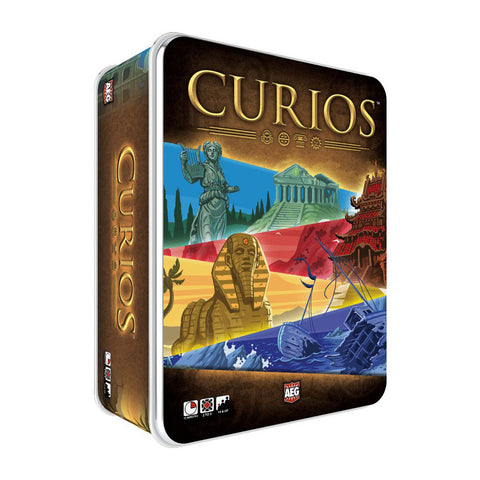Curious Project of Salad

I was able to squeeze some gaming in this week, even though my schedule was a hot mess. We started later in the evening, but we still got some solid games to the table. Enough with the dull intro, let’s get to the games!

Curios
Curios, by AEG, feels like a classic game that’s been around for a long time. The rules are simple, the gameplay is clean, and it doesn’t overstay its welcome.
Curios is a game about archeology (Um, not really, the theme is there mostly for decoration). If the deep-voiced guy from a movie trailer says, “in a world,” he’s lying. Throughout the game, players take turns placing their pawns at four archeological dig sites to collect gems/artifacts without knowing their worth. You’ll use the cards in your hand and cards revealed by the other players to deduce the value of the artifacts. You have to pay attention because those jerks, you call friends, might be bluffing. The player with the most valuable treasure wins the game.
Curios offers a nice mix of worker placement, deduction, and set collection with streamlined rules. I’m not sure how often I’ll go back to this game, but because it’s well designed and easy to play, it’ll stay on the shortlist of quick fillers.

The Artemis Project
The second game of the night was The Artemis Project, from Grand Gamers Guild, with four players. The Artemis Project is a great game. It’s more complicated than a typical gateway game, but not by much because the rules made thematic sense. Eurogames with themeless rules are the hardest to learn, and they take me out of the game. I get frustrated with games where the answer to any “why” question about the rules of a game is, “because it just is.” It seems so arbitrary.
Anywho, back to the Artemis Project. The Artemis Project is about colonizing Jupiter’s moon, Europa. The game uses dice for worker placement, and the implementation is spot-on. I never felt restricted by the dice I rolled, and you can get a lot done with low and high results. You’ll be acquiring minerals and crystals, recruiting colonists, building structures, and embarking on galactic missions.
The artwork is bright, and the theme is dripping out of the box. The choices in the game are crunchy, but they never bogged the game down with analysis paralysis. Sure, there are some take-that elements in the game, but they never felt too painful with the consolation prizes for losers.
I highly recommend this game for players who might want to take it to the next level of complexity without getting lost in the land of bland.

Point Salad
Point Salad, from AEG, is awesome. Did you want me to say more? Fine.
The rules for this one are brain dead simple. I could teach it to a loosely-trained harbor seal. Every card in the game has a vegetable on one side and a way to score points on the other. On your turn, you either take two vegetable cards from the faceup display or one scoring card from the draw deck. That’s it. The player with the most points from their scoring cards at the end of the game wins.
This game is so delightfully simple, but gripping. The artwork is fun and playful, and the gameplay is fast. Point Salad is now my go-to gateway filler game.
Editor’s note: My wife had to explain to me what vegetables were before our first game.
 |
Doug Kotecki is the Chief Curator at Tabletop Game Gallery, and even though his brain tells him not to, he still loves Taco Bell. |





